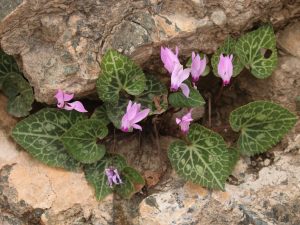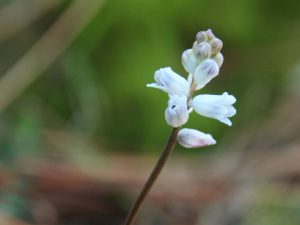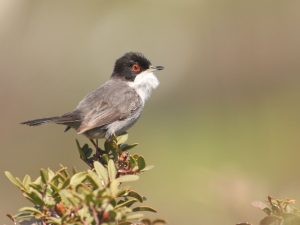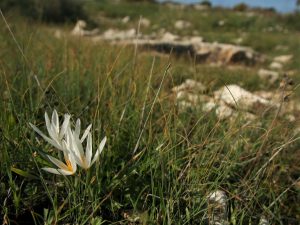
wildlife and wild flowers at Christmas
Join us on Aphrodite’s island for a relaxing festive escape.
Download leaflet
Dates
To be confirmed
Leader
To be confirmed
Price
To be confirmed
Included
Return flight London Gatwick to Cyprus. Local transport as specified in itinerary. Seven nights accommodation, full board.
Not included
Refreshments. Entrance fees to archaeological sites (c€20 in total). Gratuities. Travel insurance. ETIAS/visa costs. Covid tests and associated costs.
Group size
Minimum 4, maximum 14.
From our base in a friendly, family-run hotel on the Akamas peninsula, out on the western end of the island, we will explore the surrounding hillsides, fields and meadows in search of autumn bulbs, the earliest of the island’s many orchids and other interesting wild flowers, along with the resident bird life of the area.
We will be staying in the comfortable and friendly Aphrodite Beach hotel, situated right on the beach on the Akamas Peninsula, not far from Polis, looking out over Chrysochou Bay. From here we will explore the local area, looking for ‘autumn’ flowering bulbs including Narcissus tazetta and some lovely endemics: Crocus veneris, Colchicum pusillum and Hyacinthella milingenii alongside the first of the ‘spring’ flowers, with splashes of colour from Anemone coronaria, Cyclamen persicum and the first of the island’s many orchids: Anacamptis collina and Ophrys israelitica.
Whilst paying plenty of attention to the wonderful wild flowers, we won’t be missing out on the other wildlife this island has to offer. Resident birdlife includes Bonelli’s Eagle, Chukar and Black Francolin, with winter visitors to the island including two regional specialities: Finsch’s Wheatear and Greater Sand-plover both travel from the high Anatolian plateau to spend their winter in select spots. Sunny spells should reveal the local herptiles, including the endemic Troodos Wall Lizard.
Cyprus has a rich history, and we will spend time at a variety of historical sites including the Paphos World Heritage Site on the Paphos Peninsula.
We first visited Cyprus way back in 1991, and have been back more than 30 times since… we are looking forward to returning to Aphrodite’s island for a relaxing festive escape.
Download trip report
Please note that holidays change, although sometimes only slightly, from year to year and previous trip reports may not reflect the planned itinerary, or other holiday details, for the current trip. Please ask us if you would like to know of any significant differences.
Day 1 Our morning flight takes us to Paphos, from where we transfer to our hotel (c.1hr 30mins). There will be time to relax at the hotel or take a local walk in the afternoon, before an introduction to our holiday over drinks before dinner.
Day 2 We walk along the coast from the hotel to the Baths of Aphrodite and onwards, towards Fontana Amorosa. The field edges and track sides should feature colourful annuals and we may find the first flowers of Cyclamen persicum growing in the rockier areas, perhaps with late flowering Muscari parviflorum or Autumn Squill Prospero autumnale. The scenery is breath-taking, with high cliffs dropping down to the sea. Sunny spots should hold some of the island’s butterflies, with Clouded Yellow, Painted Lady and Plain Tiger all likely to be on the wing, while lizards scuttle about in the undergrowth, including Snake-eyed Lacertid and the endemic Troodos Wall Lizard.
Day 3 Our attention turns to the history of the island, visiting several sites around Paphos. We start with a visit to the monastery of Ayios Neophytos famous for its Byzantine frescoes. From here we move to the Tombs of the Kings, dating back to the Ptolemite Cypriot Kingdoms, where we will find interesting coast-loving plants and migrant birds among the archaeology. Finally, we spend our afternoon on the Paphos Peninsula. Aside from the well-preserved Roman mosaics, this site is known as a birding hot spot, and after soaking up the history we will see what birds we can track down.
Day 4 We explore the Pegeia Forest, on the west side of the Akamas, one of the best preserved forests of Calabrian Pine and Phoenician Juniper, where we will find an interesting variety of plants. We look for Romulea tempskyana, the winter-flowering Ranunculus bullatus and, depending on the season, we may be lucky and catch the last of the Autumn Lady’s Tresses Spiranthes spiralis, or the endemic Colchicum pusillum. We also inspect some interesting seasonal rock pools where local rarities can be found, including the diminutive Least Adder’s-tongue Ophioglossum lusitanicum. Reptiles could include Starred Agama, the tiny Snake-eyed Skink or even European Chameleon.
Day 5 We head back to the Paphos area today, stopping first near Agia Varvara, where we hope to find Finsch’s Wheatear in the dry hills. We will also visit Mandria Beach to look for interesting coastal plants.
Day 6 We take a walk across the local hillsides, where we hope to find more of the island’s interesting winter flowers, amongst which should feature a couple of species of Narcissus and perhaps the first flowers of Crown Anemone Anemone corornaria.
Day 7 We drive up to the ridge in the heart of the Akamas, starting our walk among the pines running along the centre of the peninsula, with views over to the west side, where we look for some of the plants endemic to the serpentine rocks of the area. We walk down through the pine forest into the olive and carob groves. Bulbs may include the endemic Hyacinthella millingenii and perhaps the first ‘spring’ orchids of the year, Anacamptis collina or Ophrys israelitica. After a stop for a lunch and a coffee in the village of Neo Chorio, a leisurely walk downhill will take us back to the hotel.
Day 8 After a last breakfast on the sunny patio, we must bid fond farewell to the Aphrodite Beach and head homewards.
Please note that the itinerary may be changed to suit the weather or other practicalities at the discretion of the leaders.
The Aphrodite Beach Hotel is a wonderfully welcoming family-run hotel, located on a beautiful coastline.
Meals, using fresh local produce, are taken in the lovely dining room overlooking the bay. Breakfasts can be taken on the terrace (weather allowing). Lunches will be mostly picnic packed lunches provided by the hotell: we will have one taverna lunch in the village of Neo Chorio (Day 7). All meals are included in the holiday price (dinner Day 1 to lunch Day 8).
Local travel will be by small coach.
Group flights
Group flights are with Easyjet from London Gatwick to Paphos.
It is also possible to fly direct from Manchester, Edinburgh, Bristol and Birmingham. For those flying from other airports, we can arrange individual transfers to or from the hotel.
Overland travel
You can reach Cyprus by train and ferry from the UK, with travel likely to take four to five nights. Contact us to find out more, and to make your holiday flight-free.
Time zone
Cyprus is two hours ahead of UK time.
Entry requirements
If you hold a British passport you can travel to Cyprus for up to 90 days in any 180-day period without a visa. Your passport must be issued less than ten years before the date you enter the country and valid for at least three months after the day you plan to leave.
Starting in 2026 British passport holders will need to apply for the ETIAS European Travel Authorisation to visit Schengen countries (including Cyprus, which has started the process of joining the Schengen Zone). This must be applied for online prior to travel, at a cost of €7 (free for over 70s). Once granted, your ETIAS will be valid for three years.
The weather should be pleasant, perhaps even still hot down near the coast. In general we should expect warm, sunny weather. Showers and colder conditions are always possible.
On most days, we are walking for much of the day, albeit at a relatively slow pace. The longest walk (Day 7) will be just over 7km, mostly downhill. It is necessary to walk on rougher ground and up some (gentle) slopes, although none of the walking is strenuous. Good (light) walking boots are essential. All excursions are optional.




